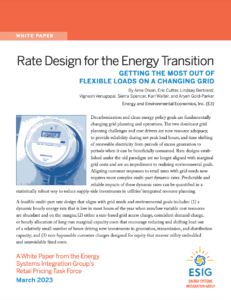Full Title: Rate Design for the Energy Transition: Getting the Most out of Flexible Loads on a Changing Grid
Author(s): Arne Olson, Eric Cutter, Lindsay Bertrand, Vignesh Venugopal, Sierra Spencer, Karl Walter, and Ari Gold-Parker
Publisher(s): Energy Systems Integration Group
Publication Date: April 4, 2023
Full Text: Download Resource
Description (excerpt):
Decarbonization and clean energy policy goals are fundamentally changing grid planning and operations. The two dominant grid planning challenges and cost drivers are now resource adequacy, to provide reliability during net peak load hours, and time shifting of renewable electricity from periods of excess generation to periods when it can be beneficially consumed. Rate designs established under the old paradigm are no longer aligned with marginal grid costs and are an impediment to realizing environmental goals. Aligning customer responses to retail rates with grid needs now requires more complex multi-part dynamic rates. Predictable and reliable impacts of these dynamic rates can be quantified in a statistically robust way to reduce supply-side investments in utilities’ integrated resource planning.
A feasible multi-part rate design that aligns with grid needs and environmental goals includes: (1) a dynamic hourly energy rate that is low in most hours of the year when zero/low variable cost resources are abundant and on the margin; (2) either a size-based grid access charge, coincident demand charge, or hourly allocation of long-run marginal capacity costs that encourage reducing and shifting load out of a relatively small number of hours driving new investments in generation, transmission, and distribution capacity; and (3) non-bypassable customer charges designed for equity that recover utility embedded and unavoidable fixed costs.
